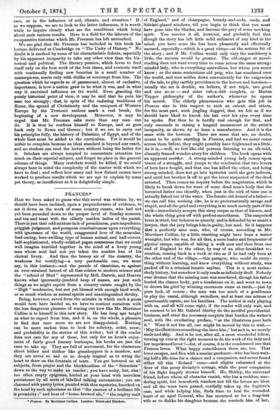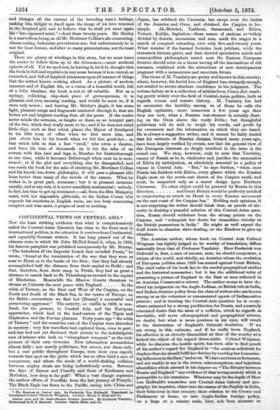FRANCES.*
HAD we been asked to guess who this novel was written by, we should have been inclined, upon a preponderance of evidence, to set it down as the work of some country curate, who had not yet been pounded down to the proper level of Sunday sermons, and tea and toast with the elderly maiden ladies of the parish. There is just that odd mixture in it of preachiness, pure impudence, priggish judgment, and pompous conclusiveness upon everything, with ignorance of the world, exaggerated love of the muscular, beef-eating, beer-swilling type of human animal, and half-covert, half-sophisticated, wholly-relished pagan coarseness that we could well imagine tumbled together in the mind of a lively young man whose soul had not yet taken the sombre hue of his clerical livery. And then the breezy air of the country, the weakness for versifying—a very pardonable one, we must say, in this instance—and the parade of classicism, as against an over-strained hatred of all that relates to modern science and the "school of Mud" represented by Mill, Darwin, and Heaven knows what ignorantly-jumbled heap of names, are just such things as we might expect from a country curate caught by the " High " tendencies, but not yet blessed with enough hard work, or so much wisdom as animal spirits and unextinguished devilry.
Being, however, saved from the mistake in which such a guess would here have landed us, we have to content ourselves with the less dangerous pleasure of tracing out how like Mr. Mortimer Collins is to himself in this new story. He has long ago taught us what to expect from him, and it is, on the whole, a pleasure to find that once more we are not disappointed. Nothing can be more useless than to look for sobriety, order, sense, and probability in the stories of this writer ; but if the reader does not care for any of these, but only for an hour's enjoy- ment of fairly good literary burlesque, his books are just the ones to take up. They are full of movement, for the characters shoot hither and thither like grasshoppers in a meadow, and they are never so sad or so deeply tragical as to wring the heart or draw on the fountain of tears. You get lectured on all subjects, from prayer and the blockheadism of the " Scientists" down to the way to make an omelet ; you have noisy, but, alas ! too often empty epigrams, hurled at your head with merciless persistence by all sorts of labelled talking automatons ; you are charmed with pretty lyrics, puzzled with thin mysteries, knocked on the head by such aphorisms as that "the essence of a brilliant life is promixity ;" and hear of "home-brewed ale," "the mighty malt • Frances. By Mortimer Collins. London: Hurst and Blacken. of England," and of champagne, brandy-and-soda, cards, and Salviati-glazed windows, till you begin to think that you must have gone into the Shades, and become the prey of some mocking spirit. You survive it all, however, and probably find that though the story has left little solid sediment of any kind in the mind, you have none the less been pleasantly and effectually amused, especially—which is a great virtue—at the serious bit of the story ; and if Mr. Collins would only vary the machinery a little, the success would be greater. The old-stager at novel- reading does not want every time to come across the same strong- minded lady, who is everything marvellous, but whom you never know ; or the same sententious old prig, who has wandered over the world, and now settles down conveniently for the exigencies of the tale, to play earthly providence to the heroes and heroines— usually the set is double, we believe, if not triple, two good and one so-so — and utter rub-a-dub couplets, or Martin. Tupper philosophy of the author's, whenever he opens: his mouth. The elderly phenomenon who gets this job in• Frances sins in this respect to such an extent, and utters, for the most part, such jingling doggrel, that we felt as if we should have liked to knock his hat over his eyes every time he spoke. But then he is hardly real enough for that, and only succeeds in raising a languid amusement at the artist's incapacity, as shown by so lame a manufacture. And it is the• same with the horrors. There are some that are, no doubt, meant to be quite startling in Frances, and had we never come across them before, they might possibly have frightened us a little.. As it is,—well, we feel like old persons listening to an oft-told,. clumsily framed wonder-story for children. The book opens with an apparent murder. A strong-minded young lady comes upon traces of a struggle, and jumps to the conclusion that two lovers, of hers have fought, and that one has killed the other, and being strong-minded, does not go into hysterics until she gets indoors, and until her brother is off to get the lover suspected of the deed arrested. Then comes an inquiry before the magistrates, which is likely to break down for want of some dead man's body that the bereaved father can identify, when just in the nick of time one is actually fished out of the water. The frantic old dotard of a father— we can call him nothing else, he is so preternaturally savage and stupid, and all the grief and everything is so much merely part of the trick—immediately accepts this stray corpse as that of his son, and the whole thing goes off with perfect smoothness. The suspected lover is tried, but behaves so queerly, and is defended by so smart a lawyer, that the jury brings him in guilty, but mad. So it happens that a perfectly sane man, who, of course, according to Mr. Mortimer Collins, by a little coaching might have been a senior wrangler, but who was, for all that, a mere loafer and frequenter of gipsies' camps, capable of taking a walk now and then from one end of England to the other, by way of an after-breakfast re- creation, coming back in a week or two as if he had only been at the other end of the village,—this paragon, who could do every- thing without learning, and knew everything without study, was packed off to a criminal lunatic asylum. This is a most melan- choly history, but somehow it only reads as infinitely droll. Nobody ever dreams that the missing man was murdered, though his father buried the chance body, put a headstone on it, and went to town to drown his grief by winning enormous sums at cards,—just by pure luck, of course ; the man was too much of a gentleman to play the rascal, although swindlers, and at least one actress of questionable repute, are his familiars. The author is only playing with us, and all will come right, if the reader will only wait, and be content to let Mr. Gabriel Shirley do the needful providential business, and utter the necessary couplets that burden the writer's soul, with the everlasting preface, "as the illustrious poet bath. it." Were it not fun all, one might be moved by this to 'wish,— 'May the illustrious something else have him ;' but as it is, we merely smile and skip. And is he not, after all, a most wonderful fellow, turning up ever at the right moment to do the work of the lady and her imprisoned lover ?—for, of course, it is the condemned one that Frances loves. What happy coincidences there are, too. That lover escapes, and flies with a maniac gardener—who has been wait- ing half a life-time for a chance and a companion, and never found either till this Roland ' came—and alights exhausted at the door of this prosy divinity's cottage, while the poor companion. of his flight happily drowns himself. He, Shirley, the universal friend, before whom all obstacles vanish, who has a reckless, wan- dering spirit, but henceforth wanders not till the lovers are blest and all the woes have passed, cordially takes up the fugitive's case, and while helping him, finds time to heal the wounded heart of an aged General, who has mourned so for a long-lost wife as to dislike his daughter because she reminds him of her,. and changes all the current of the brooding man's feelings, making him delight to dwell upon the image of his love renewed in the despised girl, and to believe that he shall yet meet again his " late espoused saint,"—dead these twenty years. Mr. Shirley is a marvellous being, as all Mr. Mortimer Collins's ale-consuming, cheese-eating, bohemian providences are; but unfortunately he is not the least human, and after so many presentations, not the least original.
There are plenty of windings in this story, but we must leave the reader to follow them up to the denouement,—most artificial episode of all. Yet we need not; in leaving it, let it be thought that the book is dull and repulsive in any sense because it is so unreal, so conceited, and full of inspired utterances upon all manner of things that the author knows nothing about. As a picture of modern manners and of English life, or a vision of a beautiful world, full of a lofty idealism, the book is not at all valuable. But as a springy, rollicking, slap-dash piece of grotesqueness, it is pleasant and even amusing reading, and would be more so, if it were only newer ; and barring Mr. Shirley's jingle, it has some light, pleasant songs and fragments scattered through it, that are better art and brighter reading than all the prose. If ,the reader never minds the sermons, or laughs at them .a.4 an integral part of the fun, which they really seem to be ; and if he does not mind little-slips, such as: that which places. the Mayor of Southpool in his fifth term of office when we first meet. him, and just elects him to his fourth when we bid him good-bye ; or that which tells us that a fast "swell," who owns a theatre, and loses his tens of thousands on it for the sake of an actress with fine hair and legs, is Member. for Scatterborough at one time, while it becomes Briborough when next he is men- toned ; or if the plot and everything else be disregarded, and one -reads the book-for the sake of studying-Mr. Mortimer Collins and his knock-'em-down philosophy, it will pass a pleasant idle hour better than many of the novels of the season. What he -writes is, in great part, nonsense ; • but it is pleasant nonsense -usually, and at any rate, it is never maudlinly sentimental; nobody, in fact, has time to get up sentiment ;—all, from the Mrs. Malaprop maid, with her impossible gibberish, to the Italian Count who expends his emotions in English verse, are too busy concocting couplets and wise saws, a propos of next to nothing.



































 Previous page
Previous page